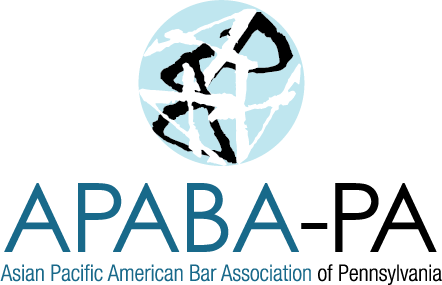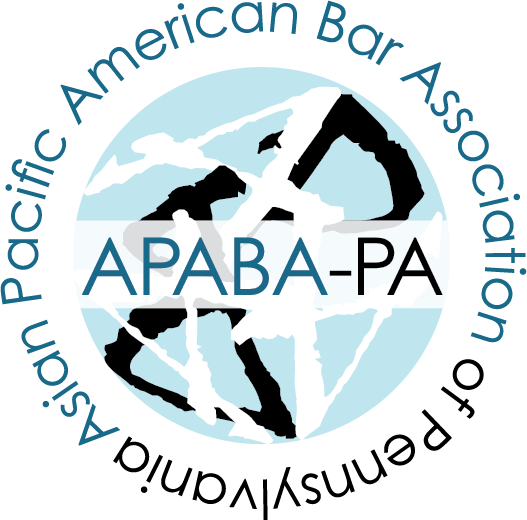APABA-PA Resolution in Support of LGBTQ+ Rights and Equality
WHEREAS, the Asian Pacific American Bar Association of Pennsylvania (APABA-PA) is committed to protecting the civil and constitutional rights of Asian Pacific American (APA) communities and other underrepresented and minoritized communities;
WHEREAS, APABA-PA values equality, community, advocacy, relationships, diversity, equity, inclusion, open-mindedness, safety, and the health and wellbeing of our members and APA communities as a whole;
WHEREAS, APABA-PA has a long-standing commitment to supporting the civil rights of all members of our community, including those who identify as Lesbian, Gay, Bisexual, Transgender, and Queer (LGBTQ+)¹;
WHEREAS, APABA-PA recognizes that there are legal, cultural, and social issues specific to the Asian Pacific American LGBTQ+ community;
WHEREAS, APABA-PA recognizes that Asian Pacific American LGBTQ+ people have a human right to be free from discrimination, threats, and violence based on their LGBTQ+ status and constitutional right to be treated equally under the law;
WHEREAS, numerous jurisdictions have considered or are considering legislation that would discriminate against, harm, or otherwise deny equal rights from Asian Pacific Americans who identify or are perceived as LGBTQ+;
WHEREAS, APABA-PA condemns all laws, regulations and rules or practices that discriminate on the basis that an Asian Pacific American individual is LGBTQ+;
WHEREAS, APABA-PA stands with the LGBTQ+ APA community and allies in advocating for the repeal of discriminatory laws and policies that threaten their rights and wellbeing; and
WHEREAS, 2023 is the 54th anniversary of the Stonewall Uprising, a momentous historic event where the LGBTQ+ community and allies protested against the discrimination and harassment faced from the New York Police Department, and sparking the very first Pride March.
THEREFORE, BE IT RESOLVED, that APABA-PA:
- Opposes any actions taken or attempts made by federal, state, local, and tribal governments that have the purpose or effect of eliminating or restricting any existing civil, constitutional, or other legally-recognized rights, which benefit or protect Asian Pacific American LGBTQ+ people;
- Urges the government, at local, state, and federal levels to repeal any existing discriminatory and unjust laws, regulations, and practices with deliberate speed and ensure the safety and equal protection under the law of all Asian Pacific American LGBTQ+ people;
- Urges the government, at local, state and federal levels, to work to defend and protect Asian Pacific American victims of anti-LGBTQ+ discrimination or conduct, including threats and violence, and to recognize and support their colleagues who take these cases as human rights advocates;
- Urges the government, other bar associations and all attorneys in jurisdictions where there are such discriminatory laws or incidents targeting Asian Pacific American LGBTQ+ people to work to defend victims of anti-LGBTQ+ discrimination or conduct, and to recognize and support their colleagues who take these cases as human rights advocates;
- Urges Congress to pass and the President to enact the Equality Act, a bill that would amend the Civil Rights Act to prohibit discrimination “on the basis of sex, sexual orientation, gender identity or pregnancy, childbirth, or a related medical condition of an individual, as well as because of sex-based stereotypes;” and,
- Authorizes the President of APABA-PA or the President’s designee to communicate the content of this Resolution to its members, other bar associations, elected and public officials, and the public at large, and to take such other action as may be appropriate.
1 LGBTQ+ is an acronym that brings together many different gender and sexual identities that often face marginalization across society. The acronym stands for lesbian, gay, bisexual, transgender, queer, and the + holds space for the expanding and new understanding of different parts of the very diverse gender and sexual identities. (See generally, https://www.hrc.org/resources/glossary-of-terms.)
ADOPTED: May 16, 2023
- On June 29, 2023

